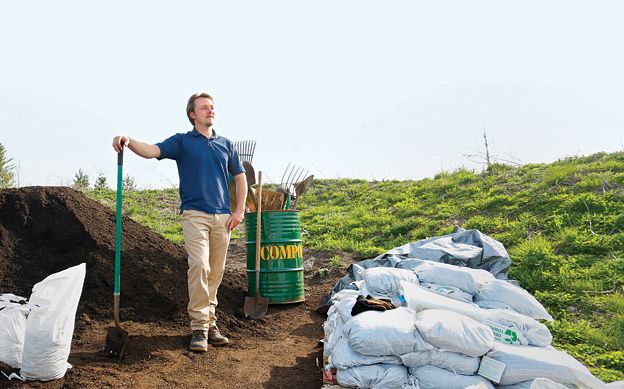Processing Your Payment
Please do not leave this page until complete. This can take a few moments.
- News
-
Editions
View Digital Editions
Biweekly Issues
- December 1, 2025
- Nov. 17, 2025
- November 03, 2025
- October 20, 2025
- October 6, 2025
- September 22, 2025
- + More
Special Editions
- Lists
- Viewpoints
-
Our Events
Event Info
Award Honorees
- Calendar
- Biz Marketplace
Garbage to Garden's founder on how the Portland-based service has grown
 PHOTo / Tim greenway
Tyler Frank, president of Garbage to Garden, has 12 employees at his Portland business.
PHOTo / Tim greenway
Tyler Frank, president of Garbage to Garden, has 12 employees at his Portland business.
Tyler Frank's Portland-based composting service, Garbage to Garden, germinated from a simple proposition when a roommate wondered, “Wouldn't it be great if we could put our kitchen scraps on the curb and have them picked up?”
“A light bulb popped on in my head — I thought, 'I bet tons of people would feel the same way,'” Frank remembers.
Turns out he was right. Interest in his program has expanded tremendously since its inception in 2012. Starting with nothing more than passion and a pickup truck, Frank has grown the business to serve six communities with 12 employees and four trucks. In addition to creating compost, Garbage to Garden facilitates converting used cooking oil into biodiesel, and even uses a byproduct to wash equipment.
True to his initial notion, Frank has kept it simple. “I looked at it from the perspective of, 'What service would people enjoy?' I didn't have the rest of it figured out. I realized I didn't need to reinvent the wheel — there were plenty of composting farms. We bring material to Benson Farms; they turn it into compost.”
Customers sign up online and for $14/month get a lidded bucket, picked up weekly and replaced with a clean one. Finished compost is free to any patron and sold or donated to community gardens and schools.
Garbage to Garden currently serves 2,600 customers, residential and commercial. “We're in a strong growth period and beginning to work with lobster processors. Businesses want to be more sustainable — so there are cross-promotional opportunities as employees learn about us.”
The company has also garnered exposure and assistance from small business training opportunities. It was a finalist in Gorham Savings Bank's recent Launch Pad contest, and Frank participated in the Maine Center for Entrepreneurial Development's Top Gun program.
Mainebiz spoke recently with Frank. An edited version of the interview follows.
Mainebiz: What kinds of start-up costs did you face? How did you finance those?
Tyler Frank: I had $300 in 'liquid assets.' All I needed were buckets to get people started. I had no overhead. We had 174 sign-ups the first month and hundreds every month after that. It's just been bootstrapped. I got small loans and we bought everything used, as cheaply as possible. I partnered with Maine Standard Biofuels for the cooking fats; grease is a really useful resource. Our fuel costs are almost one to one with credit.
MB: Have you been able to break even and take a salary?
TF: Everybody now gets paid. Our revenues grow with route density. Portland is looking at ways to support us, and there are other potential partnerships. We're saving the city tipping fees; subsidizing the program could mean lowering customer costs, making it viable for more people. We're not looking to make a lot of money. Our primary mission is to make composting easy and accessible so people will do it.
MB: Are you considering expanding to other cities in Maine?
TF: There are a lot of cities we're consulting with. With PERC [Penobscot Energy Recovery Co.] closing in 2018 in Bangor, they needed an alternative. Exeter Agri-Energy is one option. It's a 1 megawatt green power plant using methane gas to create electricity. It has a lot of capacity. We could haul for them and bridge the gap between cities and processors. There are a lot of organizations willing to help, such as the Maine Technology Institute and CEI
MB: Are there programs in other cities that you were able to use for guidance?
TF: I didn't know of any. I thought I had a novel idea and made it up from there. Almost every city now has a program, but we're much cheaper. They envisioned it as niche service for a certain customer. I envisioned it as a way to reduce the waste stream and make up with density. We're also the only ones who deliver compost. The value of that is huge if you're a gardener.
We're thriving, but it has to be closely managed. We've moved past the hard times of 100-plus hours a week. I lived in a tent at the shop last summer to keep from spending money on rent. I'm not doing that this summer. That's progress.
Correction: A previous version of this story incorrectly stated the current pricing structure.
Mainebiz web partners

The Giving Guide
The Giving Guide helps nonprofits have the opportunity to showcase and differentiate their organizations so that businesses better understand how they can contribute to a nonprofit’s mission and work.
Learn More
Work for ME
Work for ME is a workforce development tool to help Maine’s employers target Maine’s emerging workforce. Work for ME highlights each industry, its impact on Maine’s economy, the jobs available to entry-level workers, the training and education needed to get a career started.
Learn More
Groundbreaking Maine
Whether you’re a developer, financer, architect, or industry enthusiast, Groundbreaking Maine is crafted to be your go-to source for valuable insights in Maine’s real estate and construction community.
Learn more-
The Giving Guide
The Giving Guide helps nonprofits have the opportunity to showcase and differentiate their organizations so that businesses better understand how they can contribute to a nonprofit’s mission and work.
-
Work for ME
Work for ME is a workforce development tool to help Maine’s employers target Maine’s emerging workforce. Work for ME highlights each industry, its impact on Maine’s economy, the jobs available to entry-level workers, the training and education needed to get a career started.
-
Groundbreaking Maine
Whether you’re a developer, financer, architect, or industry enthusiast, Groundbreaking Maine is crafted to be your go-to source for valuable insights in Maine’s real estate and construction community.
ABOUT
NEW ENGLAND BUSINESS MEDIA SITES
No articles left
Get access now
In order to use this feature, we need some information from you. You can also login or register for a free account.
By clicking submit you are agreeing to our cookie usage and Privacy Policy
Already have an account? Login
Already have an account? Login
Want to create an account? Register
Get access now
In order to use this feature, we need some information from you. You can also login or register for a free account.
By clicking submit you are agreeing to our cookie usage and Privacy Policy
Already have an account? Login
Already have an account? Login
Want to create an account? Register







Comments